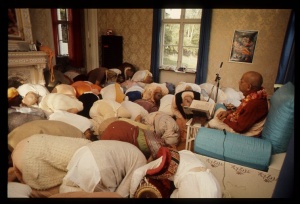SB 6.16.56

A.C. Bhaktivedanta Swami Prabhupada
TEXT 56
- ubhayaṁ smarataḥ puṁsaḥ
- prasvāpa-pratibodhayoḥ
- anveti vyatiricyeta
- taj jñānaṁ brahma tat param
SYNONYMS
ubhayam—both types of consciousness (sleep and wakefulness); smarataḥ—remembering; puṁsaḥ—of the person; prasvāpa—of consciousness during sleep; pratibodhayoḥ—and of consciousness while awake; anveti—extends through; vyatiricyeta—may reach beyond; tat—that; jñānam—knowledge; brahma—the Supreme Brahman; tat—that; param—transcendental.
TRANSLATION
If one's dreams during sleep are merely subject matters witnessed by the Supersoul, how can the living entity, who is different from the Supersoul, remember the activities of dreams? The experiences of one person cannot be understood by another. Therefore the knower of the facts, the living entity who inquires into the incidents manifested in dreams and wakefulness, is different from the circumstantial activities. That knowing factor is Brahman. In other words, the quality of knowing belongs to the living entities and to the Supreme Soul. Thus the living entity can also experience the activities of dreams and wakefulness. In both stages the knower is unchanged, but is qualitatively one with the Supreme Brahman.
PURPORT
In knowledge the living entity is qualitatively one with the Supreme Brahman, but the quantity of the Supreme Brahman is not the same as that of the living entity, who is part of Brahman. Because the living entity is Brahman in quality, he can remember the past activities of dreams and also know the present activities of wakefulness.